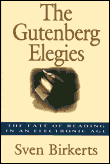

Sven Birkert's
The Gutenberg Elegies
The Fate of Reading in an Electronic Age
A Review by Susan Lewis-Wallace
Northwestern State University of Louisiana
A memory—a young girl of three or four curls around her mother's shoulder,
heavy against the pillows that prop them high on a four-poster bed. The
little girl touches the words on the page and asks her mother, "What story do
the words tell?" The mother smiles because her child has the same love of
words as she, so often does the child join her in her reverie, stolen moments there
between the pages of a book. It doesn't matter whether it's a Faulkner,
an Austen, a Wesley, or even a Zane Grey. This is a sweet moment, a magical time, a
book; a mother and child; and a child coming to the understanding that books
are a very good part of life, a knowledge that sustains and nurtures a lifetime
of exploration and adventure into the world of books--vessels for travel into a
world which creates a well of knowledge "not yet constrained by the impediments
that will eventually curb and instruct his [sic] desires" (Birkerts 89). A
well to which she will often return to drink the marrow of her adventures upon
the high seas of her reading history.
The sentiments of Emily Dickinson's poem "There
Is No Frigate Like a Book" are aptly echoed in Sven Birkerts' text
The Gutenburg Elegies: The Fate of Reading in an Electronic Age. His
book is rich with biblical, historical, and literary allusions and he proves
himself a master of metaphor in his proclamation, his prophetic warning cry to
very specific audiences--educators, lovers of books, and knowledge seekers; and
Birkerts' well-researched text proves to be a wise choice for these audiences
in particular. The text also proves to be a wise choice for those of us who
wish to insure a rich literary heritage for every little boy and girl and their
wonderful memories of golden moments with a book.
His personal reading history quite effectively seduces his readers into a
beautifully written and intimate glimpse into the life of a bibliophile. One
vicariously, or Proustean-like, savors Birkerts' delight in his adventurous
wanderlust for the written word. A now captive audience, the reader sits at
the feet of the word master and listens, ever so carefully. And as we listen,
we wonder why we haven't read more and wish that we had started sooner. He
makes those of us with grown children wish that we could go back and deepen and
expand our children's reading history--so important is it to our perception of
the world and our identity and sense of place and purpose in the scheme of
life.
Words are powerful agents which establish and sustain a culture. Birkerts
acknowledges a cultural shift in our country and views the electronic age as
causing a definite rift between our present and our past; the historical time
line is now moving along the information highway at the speed of light. He
further acknowledges that the acquisition of knowledge requires time--"deep
time," and to form a confident base of understanding is a process which
requires such "deep time." One learns in increments, layer upon layer,
receiving, reflecting, and responding from a context which forms a deep well of
information from which to synthesize in order to make meaning of one's life in
an often chaotic world.
Indeed, we are a generation of people addicted to chaos and fearful of
intimacy, fearful of the quite places within; and as Birkerts writes, that is
just where reading takes us. No wonder so many turn pale soldiers on the
battlefield, fleeing to the world of technology which transports us away from
the self, making us more apparatus-like; however, the world of reading brings
us back, making us almost human again, hopefully joyous at the rediscovery of
who we are and what we are--a complete being with a history and a future, not
merely a link in a network.
The demise of reading cannot be blamed on any one medium: television,
computers, or fax terminals. We, the educators, the book lovers, the seekers
of knowledge, must lend credence to Sven Birkerts' intelligently and
compassionately rendered text on the future of reading in an electronic age and
support his efforts to sustain our cultural literacy by a careful reading and
close consideration of what he has to say. Let us agree with Dr. Johnson
that "[t]he only end of writing is to enable readers better to enjoy life or
better to endure it." Birkerts' book helps us do both.
Birkerts' ideas on the interrelationship of the reading and writing experience
also help us to understand the need to read and respond in writing to better
retain and understand what it is we have read, producing a growing
confidence with novice writers each time
they successfully complete such a product. He speaks of writing in "terms of
pleasure, of sensuousness, of finding joy in the making and hearing of
meaningful sounds" (39). Messages such as this one sound alien to those of us
who ask our students to write an essay or research paper and rarely receive
nothing but groans and angry glances. What we ask is an alien request and
unfair when they come with no well of knowledge to draw from, as they too often
do. His message is that people can read their way to understanding and share
that new awareness with others through writing, a cyclical process which
creates and perpetuates learning about who we are as human beings. Often, we
have to look back to see how far we have come to get the courage to move ahead.
As we stand on the precipice of a more highly-advanced technological age, a
need for our history as a people chronicled on collective pages is imminent.
Sometimes we need to look back, get our bearings, and gather supplies for the
journey before we leap aboard the boxcars that will take us into the dark
forest of the future. Are we ready to sacrifice our individuality to become a
seraphic strand on a transcontinental link to the web train?
Whether Birkerts' message is considered one of nostalgic indulgence or the
words of an overly concerned bibliophile, many may well be as alarmed as he is
that "[n]o one is stepping forth to suggest that there might be something at
stake, that the headlong race to wire ourselves might, in accordance with the
gain-loss formulae that apply in every sphere of human endeavor like the laws
of physics, threaten or diminish us in some way" (220). What is this loss? As
Birkerts does, we should ask this question and consider the message of Walker Percy's "The
Delta Factor." We should consider Percy's question, "Why do we
[twentieth-century citizens] feel so deeply, if unconsciously, disconnected?"
(222). Percy goes on to cite a possible answer to his question: " . . . the
price of adaptation is habit, and that habit--of perception as well as
behavior--distances the self from the primary things that give meaning and
purpose to life" (222). Shouldn't this loss be contemplated, at least, before
we sign a contract with the technological stock brokers of our future?
Birkerts asks the hard questions. As stewards of the written word, shouldn't
we?
Works and Internet Resources Cited in the Review
Desmond, John. The Walker
Percy Society Homepage. Links to The Delta Factor Newsletter URL:
http://sunsite.unc.edu/wpercy/wpsociety.html
The Emily
Dickinson Homepage. Various volumes list key poems online. URL:
http://www.columbia.edu/acis/bartleby/dickinson/dickinson1.html#16
Lynch, Jack. The Samuel Johnson
Homepage. Extensive links to many other sites related to Johnson. Many key
works available online.URL:
http://www.english.upenn.edu/~jlynch/johnson/index.html
Stossel, Scott. Is Cyberspace Destroying Society? An
Online Conference with Sven Birkerts,
Atlantic Unbound, May 30, 1995. Very interesting online discussion.
Stossel asks some key questions here. Informal, but very important to Birkerts
scholars. URL:
http://www.theatlantic.com/atlantic/atlweb/aandc/trnscrpt/birkerts.htm
COMMENTS to Susan Lewis-Wallace

